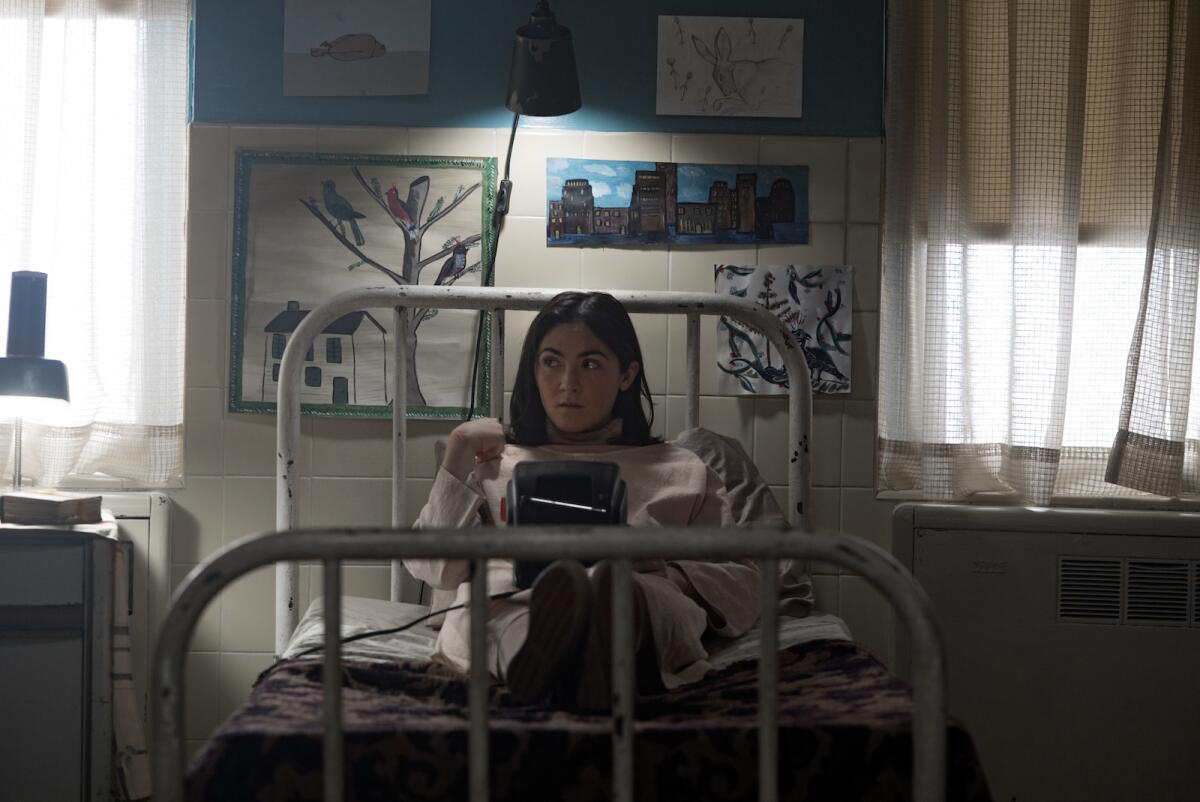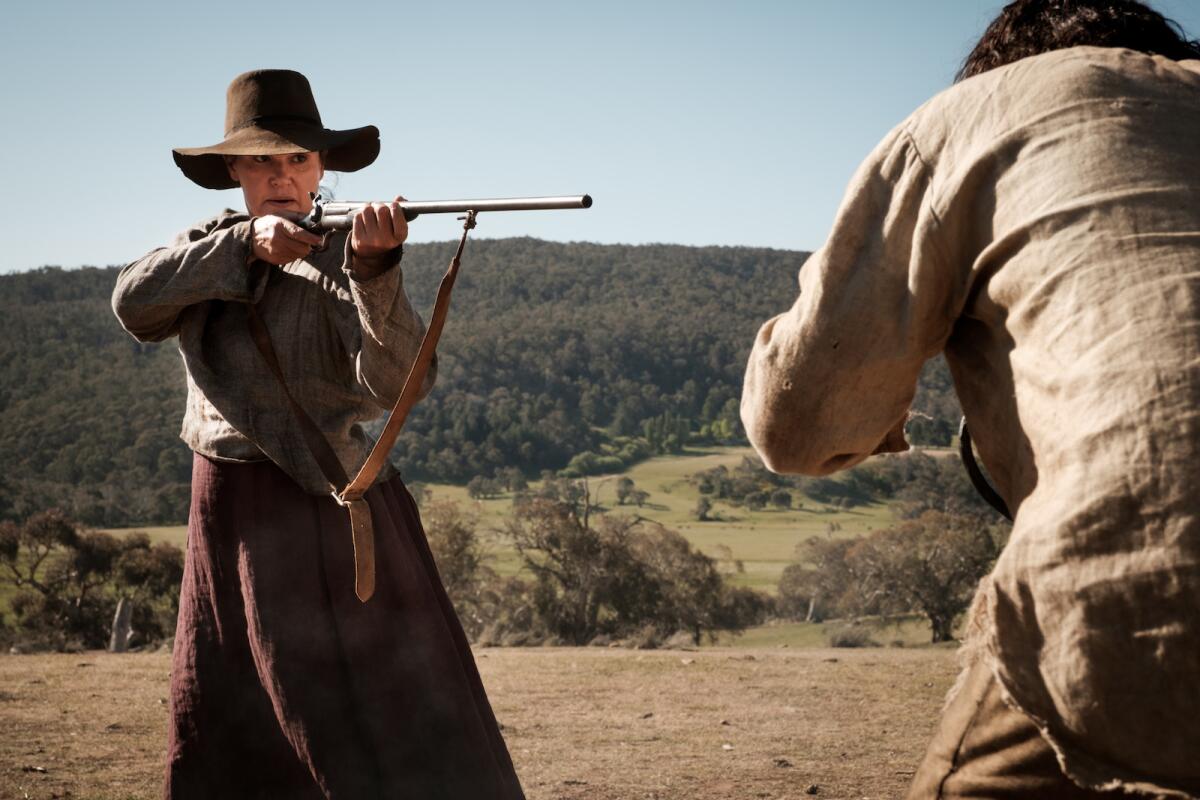Review: ‘Orphan: First Kill’ and ‘The Princess’ highlight this week’s streaming movies

- Share via
‘Orphan: First Kill’
The hit 2009 horror film “Orphan” was an effective “creepy little kid” thriller with two strong twists. First: The “kid” turned out not to be a kid at all, but rather a ferociously evil woman with a disorder that made her look like a 9-year-old. The other twist was on the production side. “Orphan” featured a stellar cast — including Vera Farmiga, Peter Sarsgaard and the phenomenal newcomer Isabelle Fuhrman — bringing unexpected nuance to a pulpy story of murder and deception.
Fuhrman returns for the prequel, “Orphan: First Kill,” though because the actor is now in her mid-20s, practical effects have been used to make her pint-sized psychopath look suitably small. The results aren’t “realistic” per se, but they’re effective enough, if you keep in mind that something’s supposed to be a little off about this child. More importantly, the effects keep Fuhrman in the franchise … and Fuhrman has gotten even better in the dozen years since she last played this character.
“First Kill” is an origin story, going back to when the villainess Leena Klammer escaped from an Estonian mental hospital and passed herself off as Esther Albright, the long-missing daughter of a wealthy American family. After the scam is underway, “First Kill” falls into a similar pattern to its predecessor as “Esther” integrates herself into her new home and then starts acting strangely, manipulating people to get what she wants and putting the ones who distrust her in harm’s way.
But director William Brent Bell and screenwriter David Coggeshall spring a surprise partway through the film, and from there, “First Kill” toys with the audience’s sympathies, pitting multiple terrible people against each other, flipping our rooting interests regularly. The movie is equal parts clever and trashy, made for people who like to see very good actors play people who are very bad.
‘Orphan: First Kill.’ R, for bloody violence, language and brief sexual content. 1 hour, 38 minutes. Available on Paramount+
‘The Princess’
Along with the loss of privacy, celebrities often lose the power to control their own story; the press and the public turn them into broadly drawn types, squeezed into soap opera narratives filled with romances, betrayals, heroism and villainy. Director Ed Perkins’ documentary “The Princess” is a nerve-wracking inside look at this phenomenon, seen via the dual perspectives of the British royal family and the people who scrutinize their every move — sometimes adoringly, sometimes cynically.
Eschewing narration, new interviews or onscreen titles, Perkins (best known for the heartbreaking doc “Tell Me Who I Am”) covers the life of Princess Diana, from her marriage to Prince Charles to her death, using only news clips and home movie footage to emphasize the pressures of fame. One of the most remarkable revelations is how well Diana handled the constant questions and camera clicks. A shy bride in her earliest public appearances, the princess later used the spotlight to draw attention to children’s charities and public health issues. But as the tabloid scandals mounted, it seemed everyone with access to a microphone had an opinion about her choices and her motivations.
“The Princess” is absorbing and surprisingly intimate, given the sources Perkins used. But it’s also a cautionary tale, which lets no one off the hook. Even the many who loved and supported Diana — who far outnumbered the skeptics — robbed her of some of her humanity, just by treating her as an icon.
‘The Princess.’ TV-14, for mild violence, adult language and adult content. 1 hour, 49 minutes. Available on HBO Max

‘The Legend of Molly Johnson’
The actor Leah Purcell reinterprets Australian writer Henry Lawson’s classic “woman against nature” short story “The Drover’s Wife” in “The Legend of Molly Johnson,” which she previously adapted into a play and novel. Purcell wrote and directed the film and also stars as Molly, a pregnant mother left alone on a small farm with her children while her husband is gone. After she sends her kids away with her district’s in-over-his-head lawman, Sgt. Klintoff (Sam Reid) — to keep them safe while she prepares to give birth — Molly befriends an aboriginal fugitive, Yadaka (Rob Collins), who knows a few secrets about her past.
While Lawson’s story was about a nameless woman protecting her young from a deadly snake, Purcell’s movie (which is not an adaptation, to be clear) fleshes out the reality of Molly’s life. Here, the woman is a steely outsider, surrounded in the bush by venomous neighbors tainted by chauvinism, racism and suspicion. “The Legend of Molly Johnson” is too ploddingly paced and too visually bland to stand with the great movie westerns — American or Australian. But Purcell does give a heartrending lead performance, playing a woman whose iron will may not be able to withstand the mob’s prejudices.
‘The Legend of Molly Johnson.’ Not rated. 1 hour, 49 minutes. Available on VOD
‘Look Both Ways’
The “Sliding Doors” scenario gets an update in the romantic dramedy “Look Both Ways,” which uses a pregnancy test as the forking path for a college graduate about to start her grown-up life. The pregnant version of Natalie Bennett (Lili Reinhart) moves back in with her parents in Austin, Texas, while the other Natalie leaves for Los Angeles to try to break into animation. Screenwriter April Prosser and director Wanuri Kahiu follow both Natalies’ stories with an eye toward the larger question of whether there’s something within people — or some force in the universe — that eventually steers them to where they need to be.
The original title for “Look Both Ways” was “Plus/Minus,” which better conveys what the filmmakers were aiming for here: exploring the ups and downs that every young adult faces, while suggesting that something good can come out of any situation. That’s a nice message for what is, overall, a nice movie. But it’s too facile to connect deeply. Everything in Natalie’s life is depicted on a surface level: motherhood, work, romance, friendship and even her passion for drawing. The differences between her two selves never seem too wide because both are barely rooted in reality. Both women, ultimately, are just characters in a movie, being jerked around on their way to a pat ending.
‘Look Both Ways.’ TV-14, for substances, adult language and suggestive dialogue. 1 hour, 50 minutes. Available on Netflix
‘Learn to Swim’
The visually striking musical drama “Learn to Swim” jumps around in time, loosely and sometimes too casually sketching a portrait of an erratic Toronto sax player named Dezi (Thomas Antony Olajide). At different points in the story, Dezi is either a passionate and vital contributor to an up-and-coming jazz combo or a sullen crank coping with a lot of pain. First-time feature director Thyrone Tommy (who also co-wrote the film with Marni Van Dyk) keeps circling back to the protagonist’s ill-fated affair with Selma (Emma Ferreira) — a singer who both inspires and maddens him — to hint at one of the reasons why he eventually becomes so distraught. More often though, Tommy just riffs freely, aping the moody, improvisatory style of classic jazz as he works some rich variations on the all-too-common story of an artist knocked around by a rough romance.
‘Learn to Swim.’ TV-MA, for adult language, nudity and smoking. 1 hour, 33 minutes. Available on Netflix
‘The Girlfriend Who Didn’t Exist’
Netflix’s strange-but-true sports documentary series “Untold” has returned for a second season, the highlight of which is the two-hour episode “The Girlfriend Who Didn’t Exist,” directed by Ryan Duffy and Tony Vainuku. The film looks back at a baffling scandal from 10 years ago, when the irreverent sports and culture website Deadspin ran an article revealing that Notre Dame football star Manti Te’o had been telling the press a fictional story about a dead girlfriend. Even odder: Te’o himself had been hoaxed, because he’d never met the person he thought he was dating. Duffy and Vainuku put the pieces of this puzzle back together, speaking to all of the principals — including Te’o — before circling back to the main point behind the original Deadspin piece. The doc is an indictment of a modern sports media seemingly more invested in arguments, analysis and smug mockery than fact-checked reporting.
‘The Girlfriend Who Didn’t Exist.’ TV-MA, for adult language. 2 hours, 4 minutes. Available on Netflix
Also on VOD
“Glorious” stars J.K. Simmons as the voice of a mysterious, Lovecraftian supernatural entity, speaking through a hole in a public bathroom stall to a lovelorn guy named Wes (Ryan Kwanten) and demanding an unspeakable favor. The movie features some framing scenes and flashbacks, but for the most part it stays in the toilet, letting a disgusting scenario inspire some squirmy horror-comedy. Available on Shudder
Available now on DVD and Blu-ray
“Daddy Longlegs” is a 2009 indie dramedy from Josh and Benny Safdie, who’ve since become among the most acclaimed filmmakers of their generation, thanks to their stylish and riveting movies “Good Time” and “Uncut Gems.” Based loosely on the brothers’ own childhood, “Daddy Longlegs” stars Ronald Bronstein as a slacker father whose anything-goes approach to raising his kids is — in typical Safdies fashion — equal parts hilarious and horrifying. Criterion
More to Read
Only good movies
Get the Indie Focus newsletter, Mark Olsen's weekly guide to the world of cinema.
You may occasionally receive promotional content from the Los Angeles Times.









